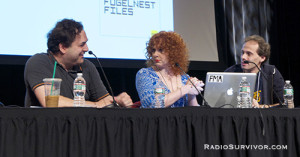
Comedy podcasters at WFMU’s RadioVision 2013 (L to R: Tom Scharpling, Julie Klausner and Jake Fogelnest)
A big reason for the emphasis on podcasting is because it’s a medium that is relatively easy to start producing. In a morning session about funding models WNYC’s VP of content development & production Chris Bannon observed, “Now you can make a fantastic show at home, you don’t need a station to reach the people you need.”
Alex Blumberg, contributing editor of NPR’s Planet Money, followed up, noting that a new program isn’t going to be picked up by stations quickly. Instead, he recommended “don’t wait for it to happen, don’t go to public stations trying to get them to fund you.”
Comedians, in particular, appear to have taken this lesson to heart. Comedy podcasts are a particularly fertile region of that media world. In an afternoon panel WFMU’s Best Show host Tom Scharpling led a spirited conversation with fellow podcasters and comedians Julie Klausner and Jake Fogelnest.
Scharpling’s program is a live broadcast featuring improvised bits and raucous listener calls that has been distributed as a podcast since 2005. Klausner and Fogelnest both feature interviews on their podcasts, though Fogelnest’s hook is that he and his guests watch YouTube videos together, making comments in real time. While it seems like an odd tact for an audio program Fogelnest said “I knew it work work from listening to (Howard) Stern go over things they watched on TV” the night before.
All three hosts made it clear that they’re not in podcasting for the money. In part this is a practical matter, since there isn’t yet a lot of money to be had. Fogelnest’s program is produced by the Earwolf podcast network which provides production support as well as a mechanism for advertising and donations. He noted that the program probably breaks even.
All three panelists were critical of comedians who they believe are podcasting for other reasons. Scharpling described that approach as “I will do a podcast so that it will get me a talk show or some kind of vehicle like that.”
Fogelnest rejected that rationale, saying “the end game with the podcast is the podcast. All I want to do for the rest of my life is talk to other people on microphones.”
Klausner said that podcasting is “the only thing I do for free consistently.”
In the earlier panel WNYC’s Bannon acknowledged that his station’s Freakonomics Radio program is still “a money loser for us that now reaches 3.5 million people a month, just as podcast.” Freakonomics is a digital first program which is also occasionally heard on other public radio programs like Marketplace.
Klausner and Fogelnest both reinforced that they produce their shows for the love of doing it. Part of that comes from the creative freedom podcasting offers. Scharpling observed that “The strongest thing about podcasts is that there are no bosses.” To which Klausner responded, saying “it’s the show you always wanted to do.”
She described how her show started out with a more rigid format, starting with a monologue, leading into two guest interviews. Over time she has loosened the approach, cutting back to one interview per episode, even offering up that she might choose to not do interviews at all some point. Klausner reflected that she often enjoys Scharpling’s show when there are no guests, saying “that’s a pure show to me.”
Both Fogelnest and Klausner agreed that they enjoy how the podcast gives them the opportunity to meet and interview people, but in a structured way. Klausner said “I don’t want to have a guest on who I don’t want to talk to.” Fogelnest agreed, “It’s just got to be somebody I care about.”
Still, the podcasters admitted that their shows do help them promote their other ventures. Klausner said “it’s like a commercial for who you are,” while Scharpling observed that podcasting provides “a direct line to the audience.”
During Q&A I asked them how sustainable their podcasts will be, given that they don’t make much money. In particular, I asked if they might have to cut back on podcasting if they get more gigs, or if they’re having a dry period professionally.
Fogelnest answered that “some nights it was the last thing I wanted to do. But I don’t want to be the jerk who doesn’t put it out.”
Klausner said that, as a listener, “you can’t complain when you’re not paying for something, and nobody is (my) boss.” At the same time she agreed that “it’s hard when you’re working full time.” But even when she’s really busy she can “just plug a microphone into the laptop,” and go.
One audience member asked the panel what public radio podcasts could learn from comedy podcasts. Klausner was quick to answer that “they could be funnier, take more risks, have people on who are younger, hipper, (have) more dirtbags on the shows.” I wasn’t able to see if Bannon and Blumberg were taking notes.


